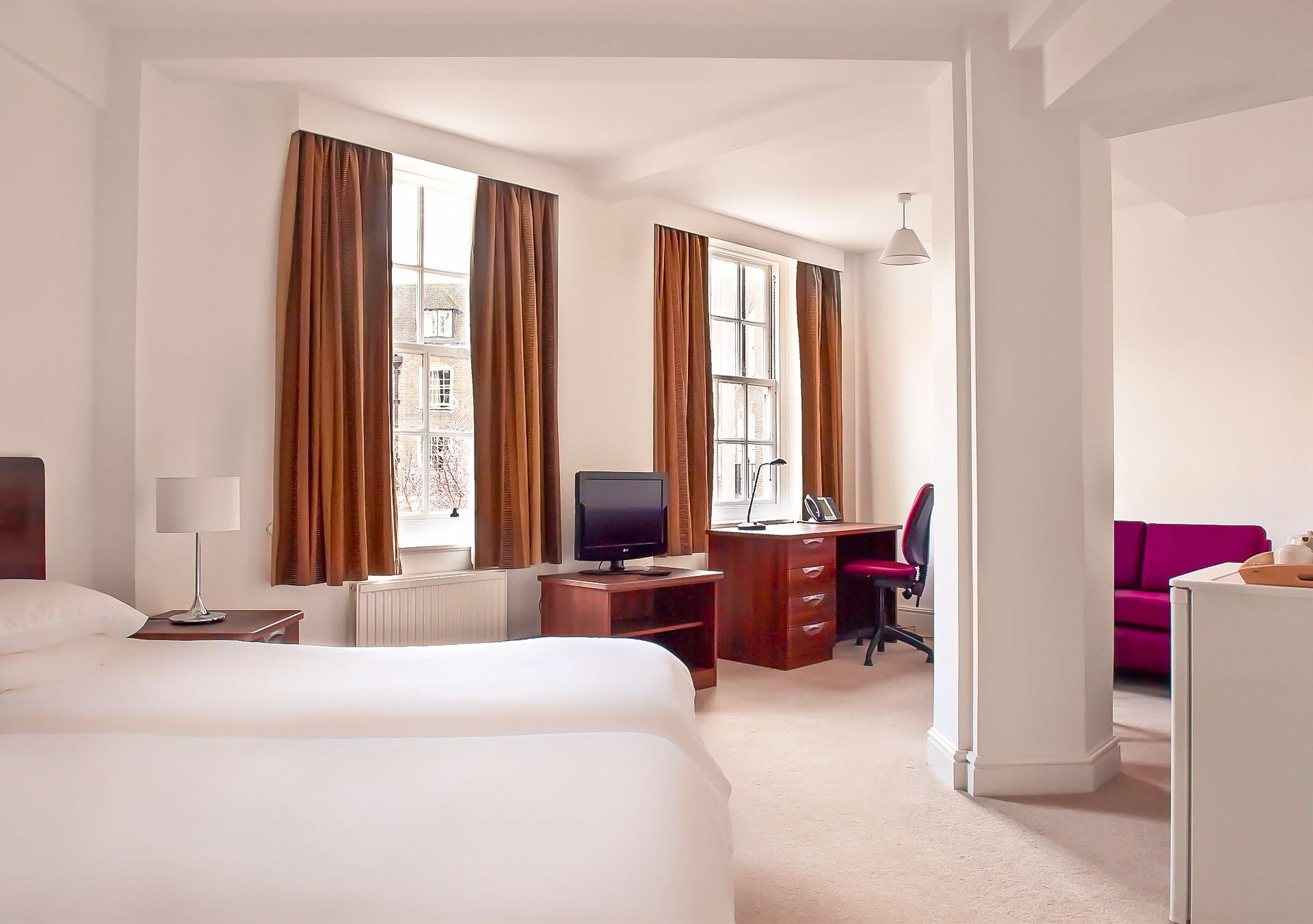Während Cambridge möglicherweise bereits in der Römerzeit existierte und sich zu einer normannischen Marktstadt entwickelte (der Name der Stadt wurde von Grentabrige oder Cantebrigge (Grantbridge) abgeleitet), hat die Universität sie zu dem gemacht, was sie heute ist.
Die Universität wurde 1209 gegründet, als eine Gruppe Oxforder Gelehrter in die Stadt zog, um der damals in Oxford herrschenden Gewalt zu entkommen. Aber auch damals hatte die Universität Probleme mit der Disziplin (!). Die Studierenden gehörten keiner bestimmten Körperschaft an, waren niemandem gegenüber verantwortlich und kamen und gingen unregelmäßig. Im Jahr 1231 gab es in Cambridge eine ausreichende Anzahl von Studenten, die anscheinend so widerspenstig waren, dass Heinrich III. eine Reihe von Verfügungen zur Bestrafung der Ungebührlichen erließ.
Es waren die Lösungen für diese Disziplinarprobleme, die Hugh de Balsham, Bischof von Ely von 1257 bis 1286, erdacht hatte und die den Grundstein für das heutige Hochschulsystem legen sollten. Er brachte die Gelehrten (heute bekannt als die „Gelehrten des Bischofs von Ely“) in zwei Häusern neben der Kirche St. Peter an der Trumpington Road unter. Dies wurde als „The House of St Peter“ bekannt und so begann sich nach und nach das College-System zu entwickeln, und Peterhouse, das erste Cambridge College, wurde geboren.
Im Jahr 1318 wurde die Universität mit einer päpstlichen Bulle von Papst Johannes XXII. offiziell getauft. Weitere Colleges folgten bald darauf: Das Trinity College (ursprünglich Michaelhouse genannt) wurde 1324 vom damaligen Schatzkanzler Hervey de Stanton gegründet, und das Clare College, ursprünglich University Hall genannt, folgte 1326. Das Pembroke College wurde gegründet 1347 gründete die Frau des Earl of Pembroke und im folgenden Jahr Edward Gonville ein eigenes College, das als Gonville Hall bekannt wurde: Dieses wurde dann 1557 von Dr. John Caius neu gegründet, um uns Gonville und Caius zu geben.
Die meisten Colleges wurden von wohlhabenden Personen aus der Kirche, der Regierung oder Grundbesitzern gegründet. Das 1352 gegründete Corpus Christi ist insofern ungewöhnlich, als es das einzige College ist, das direkt aus Mitgliedern der Stadt hervorgegangen ist. Christopher Marlow, Shakespeares berühmter Zeitgenosse, war Student am College und man kann noch heute seine Räume im alten Hof besichtigen.
Das King's College wurde im 15. Jahrhundert gegründet: Heinrich VI. beabsichtigte, es Teil einer Doppelgründung mit Eton zu werden, und es gibt Hinweise darauf, dass er damit den Plan von William of Wykeham wiederholte, der Winchester und das New College in Oxford gegründet hatte. Queens‘ wurde von Margarete von Anjou, der Frau Heinrichs VI., gegründet, und später wurde die Frau von Wilhelm IV., Elizabeth Woodville, Mitbegründerin (also Queens‘ und nicht Queen‘s). Man kann dies nicht unnatürlich als das erste äußere Symbol der Versöhnung der Häuser York und Lancaster bezeichnen.
Das fünfzehnte Jahrhundert brachte auch zwei weitere Colleges: John Alcock, der damalige Bischof von Ely, gründete Jesus im Jahr 1469 und Robert Wodelark, ein Provost des Kings College, gründete St. Catharine's im Jahr 1473.
Mit mittlerweile 31 Hochschulen hat die Universität nach und nach an Größe, Ansehen und Einfluss auf die Welt zugenommen: Ihre Absolventen haben weltweit höchste Stufen in Wissenschaft, Kirche, Regierung und Wirtschaft erreicht.
Einige bemerkenswerte Alumni und Akademiker
15 britische Premierminister, darunter Robert Walpole, der als erster Premierminister Großbritanniens gilt
Oliver Cromwell – Lordprotektor von England (1653–58) – Sidney Sussex
Sir Isaac Newton – Mathematiker, Physiker, Astronom, Alchemist, Theologe und Autor – Trinity
Charles Darwin – entwickelte die Theorie der natürlichen Auslese – Christi
Francis Crick, James Watson, Rosalind Franklin und Maurice Wilkins – etabliertes 3D-Modell der DNA
Sir Ian Wilmut – geklontes Schaf Dolly im Jahr 1996 – Darwin
Sir David Attenborough – Naturforscher und Rundfunksprecher – Clare
Stephen Hawking – Physiker, Kosmologe und Autor – Trinity Hall
Rowan Williams – ehemaliger Erzbischof von Canterbury – Magdalena
Sir Ian McKellan – Schauspieler – St. Catharine’s
Stephen Fry und Hugh Laurie – Schauspieler – Queen's und Selwyn
Sandi Toksvig – TV-Persönlichkeit – Newnham
Dame Jocelyn Bell Burnell – Astrophysikerin, die Pulsare entdeckte – Murray Edwards
Mishal Husain – Rundfunksprecher und Moderator – Murray Edwards
Tilda Swinton – Schauspielerin – Murray Edwards
Zadie Smith – Romanautorin – King's
Carol Vordemon – Moderatorin – Sidney Sussex
Naomie Harris – Schauspielerin – Pembroke College
Arianna Huffington – Schöpferin der Huffington Post – Girton
Baroness Brenda Hale – Präsidentin des Obersten Gerichtshofs des Vereinigten Königreichs – Girton
